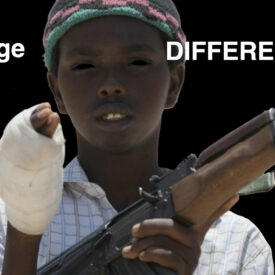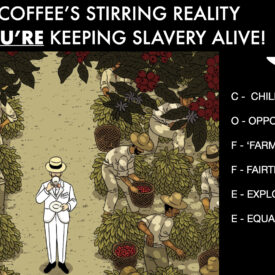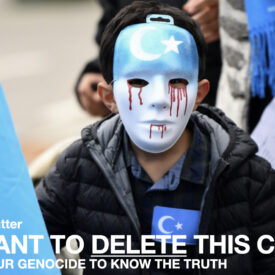Real-life Vampire
Bram Ezekial, Year 9
Scitech. I have never been here before, but everyone tells me it’s great. They tell me that the kids have so much fun that they forget to misbehave. Fantastic – exactly what I need for my two-year-old toddler. Distraction.
I look around at all of the activities. Seems like my friends are right, everyone does look happy and busy, and there’s not a toddler tear in sight. I spy a coffee shop over by the far wall. All of a sudden I can see my lovely morning stretching out ahead of me. Coffee and a muffin for me, activities for Bram, and everyone is happy!
This week has been a trying one. First, Bram got expelled from day-care. That’s right, expelled. Except the lady in charge didn’t use the term ‘expelled’.
She kindly said, “You know, some kids just don’t suit day-care, and I’m afraid your son is one of them. You shouldn’t bring him back.”
That’s ‘expelled’ in anyone’s language. He was biting other kids, apparently. Actually, not apparently, he was biting other kids. I saw the horror in his victim’s eyes every day when I picked him up. Tear-streaked faces with plastic bags full of ice-cubes perched on their legs.
Then he bit his older sister, who screamed the house down and cried for hours. An over-reaction? Maybe, maybe not. Today I just need to find something to occupy him and wear him out in a nice, safe environment. He needs to learn how to socialise with other kids in a public setting, and I need to learn to stop anxiously googling, ‘signs you are bringing up a future serial killer’.
Does your child scream for no reason? Tick. Does your child seem aggressive towards others? Tick. Does your child have unnatural habits? Tick. Clearly these are the signs that my ‘angel’ baby is fast turning into a devil child with a seriously scary future.
So, Scitech, here we are.
I order my coffee and take a seat near a long plastic tunnel. I watch Bram toddle off towards the entry to the tunnel, his chubby little legs so cute in their little blue pants. He’s so cute … but so … vicious.
There doesn’t appear to be anyone else in the tunnel, thank goodness. There are certainly no other parents around. I sit back and take a sip of my coffee, and suddenly the world seems like a better place. I can do this. I can turn my sociopathic son into a decent human being … hopefully.
My phone beeps and I glance down. Work wants me – it’s my day off, but that doesn’t stop my boss from ringing me every hour or so. I am in the middle of composing a long, detailed reply when I hear an ear-piercing scream. I spill my coffee all down my top. The scream is followed by louder and louder shrieks; it’s deafening. Two men come running over from another activity station and one dives into the end of the tunnel. He emerges seconds later holding a little blonde girl. When did she get there? Even with a red face and screwed up mouth, she is like a little angel. She has smooth fair skin, unblemished except for … a massive bite-mark on her cheek, which is oozing blood. The other man runs to the café and grabs a handful of napkins which he then uses to stem the flow of blood from the girl’s face.
My mind goes straight to denial. There must be some other kid in the tunnel, surely. Bram had just only started climbing through it. His aggression towards a total stranger couldn’t have developed that quickly, could it?
I head towards the start of the tunnel and decide to climb in to find Bram. This is partly so that I can hide from the other parents, and partly to get Bram out before he finds any other victims. It’s very claustrophobic in here and also very stuffy. Suddenly I’m wedged in and can’t go any further. I’m stuck in the tunnel! I can’t wriggle forwards. I see Bram up ahead, looking at me, smiling and waving. I yell at him to crawl towards me, but he just turns and goes further into the tunnel. I’m like an inchworm, inching my way along the tunnel with the speed of a tortoise. The only way for me to go is backwards, the way I came.
Going backwards is as fast as going forwards and now Bram is out of my sight. This is a disaster and I feel a rumbling sensation in my stomach. Finally, I get out of the tunnel. My hair is like a scarecrow, I have coffee all down my front and my lipstick is smeared across my face. I look possessed. I sprint to the other end of the tunnel to try and find my son. I peek inside to see him going back the other way. I sprint to exactly where I just was. I look in the tunnel to see him sitting in the middle giggling like a teenage girl. I put on a happy face, even though I am furious, and try every persuasive trick I know of, to get him out of that stupid tunnel. After a few minutes of trying, a large crowd starts to form.
They can feel my distress and they decide to try and help.
A lady inquires, “What’s your son’s name?”
I respond with, “Bram”, and mutter under my breath, “as in Bram Stoker, Vampire Enthusiast.”
Next thing, there is a chant echoing through Scitech. “Go Brian, Go Brian, Go Brian”. I can’t be bothered correcting them. Finally, my two-year-old criminal emerges from the tunnel grinning as though he has just been given a double choc chip ice cream. I grab him and hold him tight in my arms. Meanwhile, the crowd starts cheering and clapping. Bram turns and gives them all an angelic smile and a royal wave. My vampire son has gone from zero to hero in a matter of seconds.
I slink out of Scitech clutching my wayward offspring. I am going home to google, ‘how to keep your son out of prison’.








